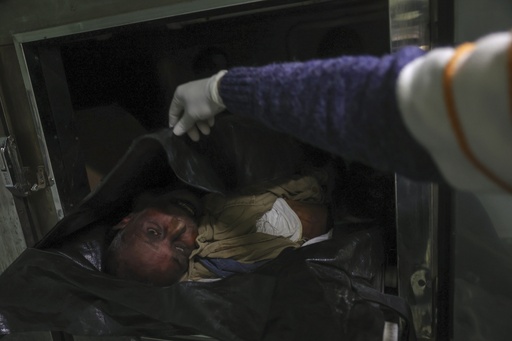Hundreds of Syrians gathered in central Damascus on Thursday to partake in the funeral procession of a prominent anti-government activist, chanting for justice for the late Mazen al-Hamada, who tragically lost his life in prison during President Bashar Assad’s tumultuous rule.
What seemed unfathomable just a week prior turned into a vivid reminder of the early protests against Assad 13 years ago, where funerals often transformed into demonstrations for change.
With the oppressive fear of government crackdowns seemingly diminished, participants expressed a mix of emotions. While many reveled in the newfound liberty to protest openly, shouting the name of the ousted president and demanding his accountability, others felt uneasy about whether this fleeting moment of freedom could persist, especially under the control of the insurgents who now dominate the city.
“Your blood will not be forgotten, Mazen,” resonated through the crowd, filled mostly with youth, as family and friends conducted funeral rites within a mosque.
Others fiercely declared, “We will take our revenge, Bashar. We will bring you to justice,” with some demanding Assad’s execution.
Initially joining the opposition movement early on, al-Hamada, 47, faced multiple arrests. After being released in 2013, he fled to the Netherlands, where he became a prominent voice against the Assad regime, sharing harrowing stories of his own torture and that of other prisoners.
Despite his fame, he returned to Syria in 2020, likely driven by assurances of safety, only to vanish shortly thereafter.
Amal al-Hamada, his sister, recounted her hopes of reuniting with her brother as the insurgency advanced on Damascus. Instead, she learned of his death when his body was discovered in a hospital alongside numerous others, some appearing severely emaciated or bearing signs of torture. According to her, he seemed to have been killed just days prior to their discovery.
“I held out hope for his release. Learning he was executed broke my heart,” she lamented.
Zeina Baaj, hailing from al-Hamada’s hometown, emphasized that his case represented just a fraction of a larger crisis, stating, “There are many like Mazen … he is just the tip of the iceberg.”
Relatives of those who disappeared in Assad’s repressive regime continue to seek answers about their loved ones. With many flocking to prisons and detention facilities, the grim discovery of bodies in morgues highlights the uncertainty surrounding the fate of numerous detainees.
During Thursday’s sombre procession, attendees carried al-Hamada’s body from the al-Mujtahid hospital to a central mosque, subsequently marching through al-Hijaz Square before finally laying him to rest in a suburb.
One marcher, Fares Abul-Huda, recalled how his brother, then working as a hospital staffer, was taken from his post back in 2012, leaving his family in the dark about his whereabouts ever since. “They were ruthless,” he shared, emphasizing the enduring pain of uncertainty.
Participants, some of whom had last protested in Damascus over a decade ago, conveyed their disbelief at their ability to gather openly now. “I never imagined being part of such a rally in any shape or form in Damascus,” Mohammad Kulthum, 32, declared, accompanied by his mother at the march.
Bayan Andoura, who was only 14 when the uprising began in 2011, attended her first rally, expressing the surreal feeling of finally being able to voice her thoughts publicly. “It’s incredible to express ourselves in a place where we were silenced,” she pointed out, sharing the experience with her peers.
Participants voiced respect for past protests while also looking forward to creating new chants. However, unease lingered about the future, particularly concerning the insurgent coalition that spearheaded Assad’s removal, Hayat Tahrir al-Sham (HTS), which includes extremist factions. Many remain skeptical of the leadership’s aim for a more inclusive future compared to its historical affiliations.
The march was intermittently marked by moments of tension, as armed individuals discharged firearms in support, though the crowd urged them to cease the act. Observing from the sidelines, Hani Zia was engulfed with emotion, as the procession stirred feelings of joy, pain, and sorrow within him.
The grim history of detention centers is just one aspect of the harrowing story where hundreds of thousands have fallen victim to state violence against villages and communities across Syria. In an effort to escape the government’s ruthless crackdown, Zia fled to Damascus from his hometown, where many perished.
“Freedom carries a heavy price,” he acknowledged. “We paid it with the lives of our loved ones.”
As worries surface about the sustainability of such public demonstrations, Zia admitted uncertainty about the future of similar public gatherings. “I can’t predict if we will witness such scenes again,” he contemplated, voicing a profound hope for genuine freedom in the streets where people could live without constant scrutiny regarding their identities or beliefs.



